Tag Archive: speech intelligibility
April 18, 2019
by Carole Zangari -
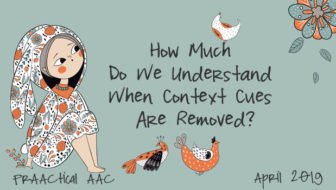
Have you ever worked with clients who could benefit from AAC but resisted using it because they don’t realize that other people can’t understand their speech? Or a family who resists AAC because they perceive their loved one as intelligible when they are actually depending on the context to help them decipher the message? Have you ever worked with service providers who disagree on just how comprehensible their client’s natural speech really is? It doesn’t happen often, but there are occasions when it can be helpful to remove context cues from the mix and take a hard look at how well we understand someone’s natural speech. Formal testing may certainly play a role here, but informal assessment activities can also be helpful. Here is a task we sometimes use in these situations. The Materials Develop a list of 20 words and/or 20 sentences that will serve as the stimuli. For... [Read More...]
Filed under: Featured Posts, PrAACtical Thinking
Tagged With: informal testing, natural speech, speech intelligibility
September 18, 2017
by Carole Zangari -
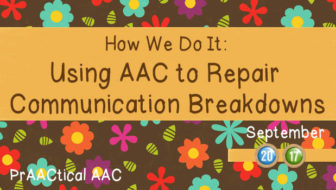
We’ve had many nice comments about the resources shared by AAC SLP Alicia Garcia, clinical lead of the AAC Clinic at One Kids Place, a children’s treatment centre in northern Ontario. With over two decades of experience in pediatric rehabilitation practice in private and public settings, Alicia’s ideas for how to support AAC learners and their families are tried and true. In today’s post, Alicia shares thoughts and materials for situations in which the AAC is needed to repair communication breakdowns. :::::::::::::::::::::::::::::::::::::::::::::::::::::::::::::::::::::::::::::::::::::::::::::::: Children with unclear speech not only have different intelligibility levels but also different levels of awareness, focus, and interest on repairing their communication breakdowns. We use different approaches based on how they react and respond when they are not understood. As a general guideline when a communication breakdown occurs, regardless of the child’s profile, we first try determining the level of urgency or importance of the child’s intended... [Read More...]
Filed under: Featured Posts, PrAACtical Thinking
Tagged With: Alicia Garcia, communication breakdown, repair, speech intelligibility
May 12, 2015
by Carole Zangari -
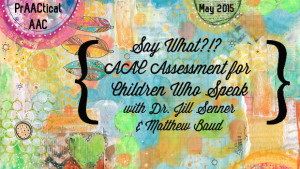
While the Index of Augmented Speech Comprehensibility in Children (I-ASCC) has been around for almost 20 years, few clinicians know and use it. In this post, we welcome back Matthew Baud and Jill Senner to talk about how they are using this assessment tool. Enjoy! AAC evaluations can be challenging, especially if there is disagreement among team members as to whether AAC is necessary or not. We frequently see disagreements about AAC arise when a student is able to speak. Let’s examine the following case. Mrs. Brown has had Johnny in her class for the last 2 years and she “understands everything” he is saying during their routine calendar time. The new SLP, who only sees Johnny once weekly for 30 minutes, tried to elicit information about his weekend at home and reported that she “didn’t understand anything.” What is going on here? How can two communication partners have such vastly... [Read More...]
Filed under: PrAACtical Thinking
Tagged With: assessment, Jill Senner, Matthew Baud, speech intelligibility
February 20, 2014
by Carole Zangari -
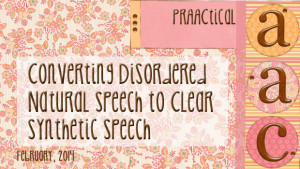
One of the exciting things about being in an AT-related field, is watching new developments in technology. Many of us have worked with individuals who have intact language and severely impaired speech. When we last wrote about ViVoca (Voice-Input, Voice-Output Communication Aid), it generated a lot of interest as a potential support for some individuals who struggle with face-to-face communication. The research efforts are lead by Dr. Mark Hawley, Professor of Health Services Research at the University of Sheffield, in the UK. We’re pleased to be able to share a video showing this emerging technology in aaction. Direct Link: http://www.youtube.com/watch?v=qTyjlM2jYMs
Filed under: PrAACtical Thinking
Tagged With: intelligibility, research, SGD, speech intelligibility, technology, ViviVoca
June 15, 2013
by Carole Zangari -

Anyone who has had a conversation with someone affected by aphasia is probably familiar with the ‘20 Questions’ approach to resolving communication breakdowns. Asking questions helps us take the piece of the message we understand (or think we do!) and build on that to gain more insight into the communicator’s intent. Take this exchange between a woman, Sandy, and her mother-in-law, Joan. Joan had a stroke a few years back and has both aphasia and dysarthria. Joan: “Gay” Sandy: “Gay? What do you mean, mom? Someone’s gay?” Joan: Shake head. “Gay” Sandy: “I’m not sure, mom. Gay?” Joan: “Gay” Points to the front door Sandy: “Kay? Are you telling me about Kay from across the street?” Joan: “Gay.” Nods Sandy: “What about Kay? Did she call?” Joan: Shakes head no Sandy: “Do I need to call her?” Joan: Shakes head no Sandy: “Did she stop by?” Joan: “Aaadihdih” Sandy: “Did... [Read More...]
Filed under: Strategy of the Month
Tagged With: alphabet supplementation, aphasia, speech intelligibility, supplementation strategies, topic supplementation
November 23, 2012
by Carole Zangari -
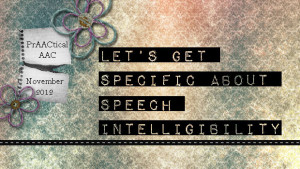
When we’re writing AAC evaluation reports, compiling funding documents, and summarizing the present level of performance in IEPs, we frequently comment on speech intelligibility. In some cases, we’ve administered a standardized assessment instrument and are sharing those results. Often, though, the comments are more descriptive in nature. It is not uncommon to read documentation in which someone with articulation difficulties is described as having speech intelligibility that is mildly, moderately, or severely impaired. Those categories are pretty broad, open to interpretation, and can be quite vague. What do we really mean when saying that someone does or doesn’t have intelligible speech? To narrow down the meaning, we specify the two variables that have the greatest influence on how comprehensible the communicator’s speech output actually is: the context and the communication partner. Specifying whether the context is known and the partner is a familiar one, helps us better interpret the descriptors... [Read More...]
Filed under: PrAACtical Thinking
Tagged With: documentation, report writing, speech intelligibility





